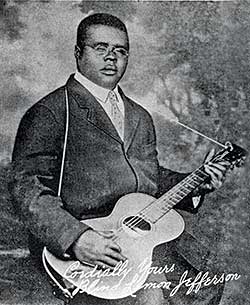Be Unsatisfied! Demand Technology that Works as it Should
Be unsatisfied with technology until it gives you the result you want.
You've probably never heard of Blind Lemon Jefferson. It's not surprising that most folks don't know much about this man. The records are conflicting on whether he was born in 1893 or 1894 into a sharecropper family with eight children near Wortham, Texas. There is only one known photo of Jefferson in existence, and even that has been doctored with a hand-drawn tie. His early death at about 36 added to the mystery surrounding his life and legacy. But what we do know was that between 1926 and 1929 he recorded more than 100 songs, helped create the Texas Blues sound, and became one of the first successful male solo guitarists and vocalists in the recording industry. His influence helped Paramount Records become the top blues record label in the 1920s.
As a musician, singer and songwriter, Jefferson served as an inspiration to artists such as B.B. King, Doc Watson, Chet Atkins, Lead Belly, and Lightnin' Hopkins. His songs have been covered by The Beatles, Bob Dylan, and the Grateful Dead, and the Rock and Roll Hall of Fame lists "Matchbox Blues" as one of the top 500 rock songs of all time. His legacy has been referenced in video games, films, and TV shows. But the most interesting part of his story was that Jefferson was unsatisfied with technology. His focused ear was unhappy with the results of his initial recordings for Paramount Records, and in 1927 he jumped ship to OKeh Records. He only recorded two songs, "Matchbox Blues" and "Black Snake Moan," with OKeh, but the quality was notably better. After seeing the success of the better-recorded songs, Paramount Records re-signed Blind Lemon Jefferson, upgraded its recording equipment, and climbed to the top of the charts.
 We are generally unsatisfied with technology already, so why would I feel the need to ask us to be even more so? The problem stems from how we view technology. We salivate over the new retina screen features and lust after higher pixel capturing devices, but to what end? We would do well to look at what Jefferson can teach us about being unsatisfied. He was not happy with the technology because he couldn't reach his end goal. Once he got the sound that satisfied his ears, he was happy. Blind Lemon Jefferson started with the end in mind. With no eyesight to distract his senses, he knew exactly what he wanted his music to sound like, and he changed studio technology until he found what he wanted.
We are generally unsatisfied with technology already, so why would I feel the need to ask us to be even more so? The problem stems from how we view technology. We salivate over the new retina screen features and lust after higher pixel capturing devices, but to what end? We would do well to look at what Jefferson can teach us about being unsatisfied. He was not happy with the technology because he couldn't reach his end goal. Once he got the sound that satisfied his ears, he was happy. Blind Lemon Jefferson started with the end in mind. With no eyesight to distract his senses, he knew exactly what he wanted his music to sound like, and he changed studio technology until he found what he wanted.
Most of us, however, fall into the trap of running after features for their own sake. With the ever-escalating war of new features, gadgets, and devices, I am recommending a new policy for acquiring new technology. Look at your projects and the work you are doing. Are you happy with the outcome? Is there specific technology that would improve it? Will it make your end product more profitable? If you said yes to these questions, then go for it!
Technology is a means to an end, and we should be unsatisfied with it until it produces the result we want. So next time you see the latest flashy tech announcement that is supposed to revolutionize your business, close your eyes and take a moment to think. Am I satisfied with what I have? Will this new technology or feature help me build better things? Staying focused on the results will help you make good technology decisions.
Probably the most sober reminder from the legacy of Blind Lemon Jefferson is that the technology for recording and distributing music has changed hundreds of times since his death in 1929. But his songs live on, and the title of his 1927 hit "See That My Grave Is Kept Clean" is, after years of neglect, being honored today in the Blind Lemon Memorial Cemetery in Wortham.
[This article appears as "Can't Be Satisfied" in the August/September issue of Streaming Media magazine.]